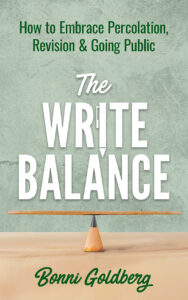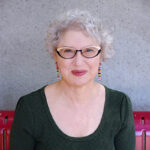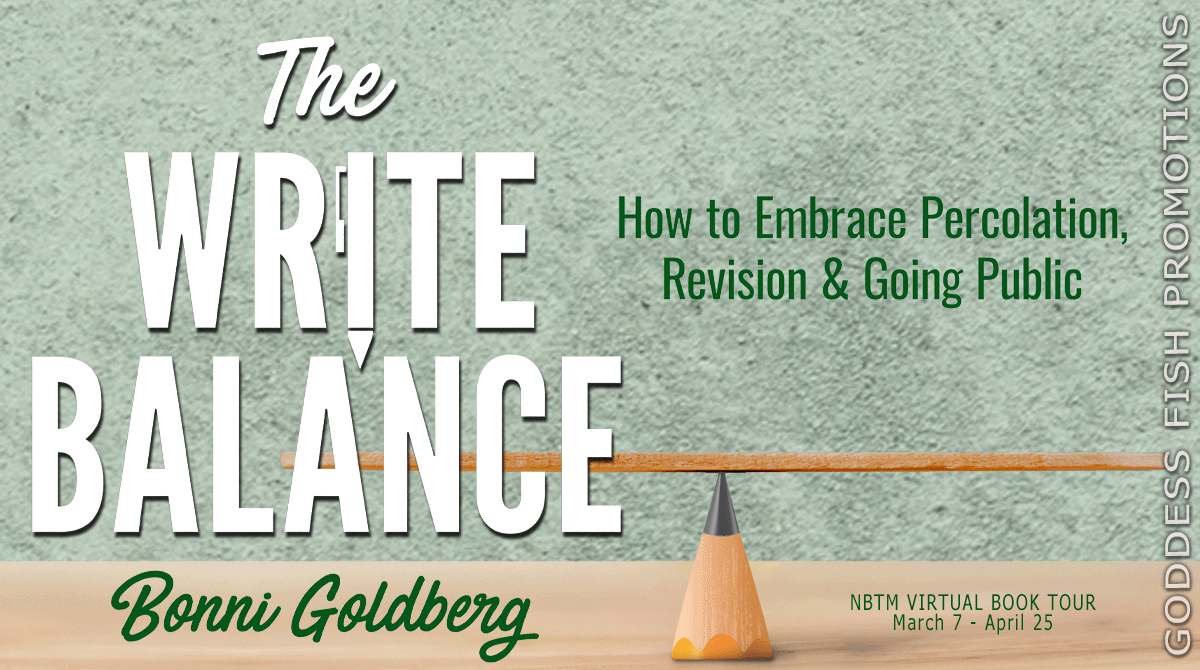 Today I’m chatting with Bonni Goldberg about her new book on writing advice, The Write Balance: How to Embrace Percolation, Revision & Going Public.
Today I’m chatting with Bonni Goldberg about her new book on writing advice, The Write Balance: How to Embrace Percolation, Revision & Going Public.
During her virtual book tour, Bonni will be awarding a prize to a randomly drawn winner. The winner can choose between a 30-minute coaching call, a Q&A Zoom with their group, or feedback on 3 double-spaced pages of their work (via email). EVERYONE who enters the raffle will receive a free e-book about balancing writing & marketing. To be entered for a chance to win, use the form below. To increase your chances of winning, feel free to visit her other tour stops and enter there, too!
Bio:
Bonni Goldberg is the author of The Write Balance: How to Embrace Percolation, Revision & Going Public, the companion book to the best-seller Room to Write: Daily Invitations to a Writer’s Life. Bonni is an award-winning poet and writer. She is the creator of the 2 Minute Journals™ series. Both traditionally and indie published, her books include non-fiction for adults and fiction and non-fiction for young readers. Her essays and blog posts can be found in many print and online publications.
Bonni teaches creative writing at colleges and leads writing workshops internationally for all ages. She knows everyone is creative, and she supports people to discover and share their authentic, meaningful, and imaginative experiences through words.
Whether through her writings or through teaching, her methods and perspectives continue to empower thousands of adults, families, and children.
Bonni is also a Jewish educator. She speaks, writes, and leads workshops on Jewish topics such as Jewish identity, rituals and antisemitism at Jewish women’s events, JCCs, and conferences.
She lives in Portland, Oregon with her partner in life, and some creative projects, artist Geo Kendall.
Welcome, Bonni. Please tell us about your current release.
In The Write Balance, the companion book to the beloved bestseller, Room to Write, Bonni Goldberg explains how to find fulfillment as a writer by embracing three aspects of writing: 1) Percolation: what takes place before writing a first draft; 2) Revision: the writer’s role after the initial draft; and 3) Going Public: the writer’s mission once the writing is done. Filled with tools, examples and exercises, Bonni’s guide offers motives, choices, and encouragement for writers to appreciate and to be creative in the phases before and beyond a first draft. Whether you’re new to writing or a pro, become more passionate and balanced in your writing life.
What inspired you to write this book?
One inspiration is from teaching writing. In that role, my job is to help people make progress with their writing. Whether through cultivating creativity, getting jump-started, tackling obstacles, rewriting, or publishing, my goal is always the same: to supply people with tools and perspectives to develop, discover, and enjoy more about their writing. I realized most frustrated writers are stuck in their relationship to percolation, revision, or going public. It’s happened to me too. I wrote this book to provide other writers with a place to go to get unstuck and to find tools to embrace their creativity again. Teaching is one place I reconnect to mine. I hope this book returns the favor.
Excerpt from The Write Balance:
The public aspect of writing is the third and final practice you must take part in to nourish your Writing Self. You may think of going public as a writer as publishing, but it’s much larger than that. When you make writing, you enter a new relationship to the written word that includes passing it on to others. Going public is doing your part to bring the written word to the rest of the world. The words you offer can be your own or someone else’s. You can give them to a large group of strangers or to a few people you are close to. But to fulfill yourself and your role as a writer, you must complete the writing cycle by being public somehow. We get convoluted messages about going public that are tangled up in perceptions about publishing companies and best-seller lists because we don’t talk enough about the bigger picture. Writers often can’t see past the publish-with-a-big-traditional-publisher-or-perish perspective because the value of other options—sometimes even the options themselves— aren’t clear. Indifferent agents, editors, and publishers aren’t what frustrate your attempts to go public. Your frustration is caused by a set of internal limitations that may include your particular definition of success as a writer, misconceptions about the purpose of going public, a fear of rejection, and misunderstanding your role as a writer. We’ll deal with these frustrations and others throughout this section, beginning here by reviving the idea of “sharing,” an overlooked definition of going public.
What exciting story are you working on next?
I’m percolating an eco-historical fantasy in verse from the point of view of a seed. I’ve never written fantasy, a verse novel or from a non-human point of view. Nothing like a challenge! I’m revising a collection of essays called Met Me at the Death Café. And I’m publishing a children’s picture book with a traditional publisher.
 When did you first consider yourself a writer?
When did you first consider yourself a writer?
I definitely considered myself a writer before I was published. I’ve said elsewhere that I identified as a poet first, not a writer. I considered myself a poet by my senior year in high school. I chose the college I went to because it had a creative writing program. I didn’t equate it with some measure of success related to being published or recognized by others. It was a fact. I devoted myself to writing poetry, and that made me a poet. As a writer, teacher, and mentor, I still hold this basic truth about being a writer.
Do you write full-time? If so, what’s your work day like? If not, what do you do other than write and how do you find time to write?
I don’t write full-time. There were periods of my life I did. Even then, I did some part-time teaching writing and private coaching with individual writers. Writing full-time is too isolating for my temperament. My day job is as an Academic Advisor at a community college. I work four ten-hour days. On the day I don’t work and on the weekends, I write.
What would you say is your interesting writing quirk?
I’m not sure I have one. I still start every writing project with pen and paper. That’s as quirky as I get.
As a child, what did you want to be when you grew up?
I wanted to be a psychiatrist. My father was one. I was an empathetic kid. It was probably because, as part of my neurodiversity, I felt things deeply. Writing isn’t too far off from what I thought being a psychiatrist was at the time.
Anything additional you want to share with the readers?
If you write, you’re a writer. If you have questions, please reach out. Thank you for inviting me to your community, Lisa.
Links:
Website | Facebook | Twitter | Instagram
Get your FREE copy of Writing & Marketing: 8 Authors Reveal Their Secrets here: https://bookhip.com/PASGHHQ


Thanks for hosting!
Great excerpt and cover.